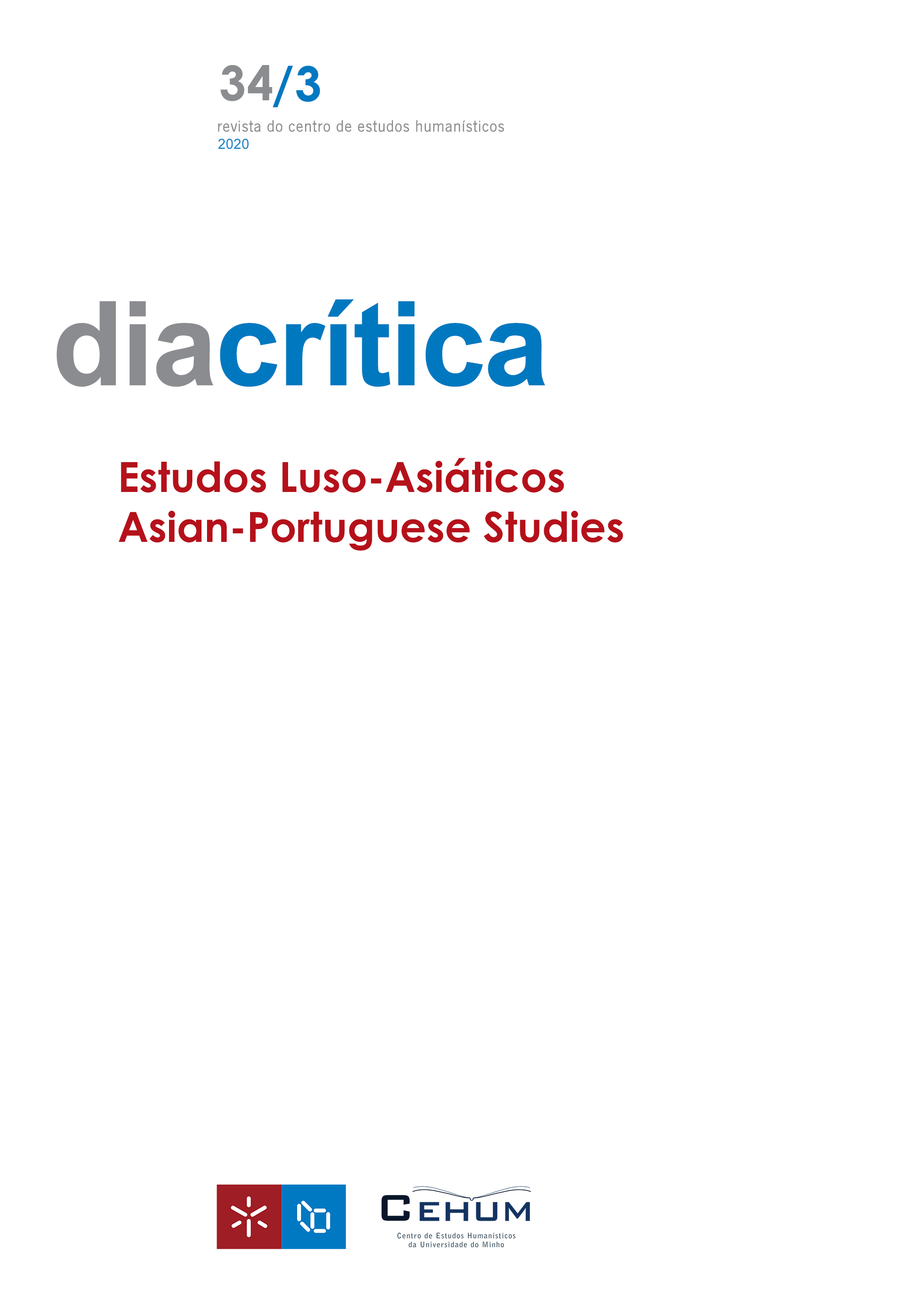O Meu Pé de Laranja Lima na China: Receção e tradução
DOI:
https://doi.org/10.21814/diacritica.5005Palavras-chave:
Estudos de tradução, O meu pé de laranja lima, Vasconcelos, Literatura infantilResumo
O meu pé de laranja lima, um romance infantil brasileiro, escrito por José Mauro de Vasconcelos, foi traduzido de português para chinês,pela primeira vez,e publicado na Chinaem 2010. Desde então, o livro tem sido um grande sucesso no país. Este artigo tenta demonstrar os fatores da popularidade desta obra na China do ponto de vista de cinco perspetivas, nomeadamente:conteúdo do livro, profissionais e patronagem, desenvolvimento da internet, influência coreana e estratégias de tradução. Também são discutidos os problemas de tradução desta obra a fim de captar a atenção para o papel da tradução na promoção de obras literárias noutro país.
Referências
Ashok, V. G., Feng, S., & Choi, Y. (2013). Success with style: Using writing style to predict the success of novels. In EMNLP 2013 (Proceedings of the 2013 Conference on Empirical Methods in Natural Language Processing). Washington: ACL. Consultado em https://www.aclweb.org/anthology/D13-1181.pdf
Bartle, C., Avineri, E., & Chatterjee, K. (2013). Online information-sharing: A qualitative analysis of community, trust and social influence amongst commuter cyclists in the UK. Transportation Research Part F: Traffic Psychology and Behaviour, 16, 60–72. https://doi.org/10.1016/j.trf.2012.08.013 DOI: https://doi.org/10.1016/j.trf.2012.08.013
Beck, J. (2007). The sales effect of word of mouth: A model for creative goods and estimates for novels. Journal of Cultural Economics, 31(1), 5–23. https://doi.org/10.1007/s10824-006-9029-0 DOI: https://doi.org/10.1007/s10824-006-9029-0
Boon, E., Pitt, L., & Salehi-Sangari, E. (2015). How to Manage Information Sharing in Online Marketplaces – An Exploratory Study. In K. Kubacki (Eds.), Ideas in marketing: Finding the new and polishing the old. (pp. 538–541). New York: Springer. DOI: https://doi.org/10.1007/978-3-319-10951-0_194
Carmi, E., Oestreicher-Singer, G., & Sundararajan, A. (2012). Is Oprah contagious? Identifying demand spillovers in online networks. (NET Institute Working Paper No. 10-18). https://doi.org/10.2139/ssrn.1694308 DOI: https://doi.org/10.2139/ssrn.1694308
Chevalier, J. A., & Mayzlin, D. (2006). The effect of word of mouth on sales: Online book reviews. Journal of Marketing Research, 43(3), 345–354. https://doi.org/10.1509/jmkr.43.3.345 DOI: https://doi.org/10.1509/jmkr.43.3.345
Clement, M., Proppe, D., & Rott, A. (2007). Do critics make bestsellers? Opinion leaders and the success of books. Journal of Media Economics, 20(2), 77–105. https://doi.org/ 10.1080/08997760701193720 DOI: https://doi.org/10.1080/08997760701193720
Hermans, T. (1985). The manipulation of literature: Studies in literary translation. London: Croom Helm. Kommonen, K. (2011). Narratives on Chinese colour culture in business contexts. Cross Cultural Management: An International Journal, 18(3), 366–383. https://doi.org/10.1108/ 13527601111152879 DOI: https://doi.org/10.1108/13527601111152879
Kovács, B., & Sharkey, A. (2014). The paradox of publicity: How awards can negatively affect the evaluation of quality. Administrative Science Quarterly, 59(1), 1–33. https://doi.org/10.1177/0001839214523602 DOI: https://doi.org/10.1177/0001839214523602
Kumar, R. (2016 november). A note on colour psychology of Indian and Chinese culture and possible impact on advertising. Paper presented at International Conference on India, China and The New World Order, Bhubaneswar, Odisha. Consultado em https://www.researchgate.net/publication/312172043
Lefevere, A. (1992). Translation, rewriting and the manipulation of literary fame. London: Routledge.
Lefevere, A. (2016). Translation, rewriting, and the manipulation of literary fame. London: Routledge. (original publicado em 2006) DOI: https://doi.org/10.4324/9781315458496
Li, L. (2014). A última batalha. Dalian: Editora Dalian. Liu, L., & Pan, Y. (2017). Review of 20 years of internet development in China. In Y. Xie (Ed.), New media and China's social development. Research series on the Chinese dream and China’s development path (pp. 1–14). Singapore: Springer. DOI: https://doi.org/10.1007/978-981-10-3994-2_1
Loan, F. A. (2011). Impact of internet on reading habits of the net generation college students. International Journal of Digital Library Services, 1(2), 43–48. https://doi.org/ 10.24815/siele.v5i1.8966
Munday, J. (2016). Introducing translation studies: Theories and applications. London/New York: Routledge. DOI: https://doi.org/10.4324/9781315691862
Ngugi, M. N., & Mberia, H. K. (2014). The influence of the internet surfing on the reading culture of secondary school teachers: A case study of newspaper readership in Kigumo Sub County, Kenya. International Journal of Academic Research in Business and Social Sciences, 4(11), 96–110. https://doi.org/10.6007/IJARBSS/V4-I11/1275 DOI: https://doi.org/10.6007/IJARBSS/v4-i11/1275
Nord, C. (2001). Translating as a purposeful activity: Functionalist approaches explained. Shanghai: Shanghai Foreign Language Education Press.
Sorensen, A., & Rasmussen, S. (2004). Is any publicity good publicity? A note on the impact of book reviews (NBER Working paper, Stanford University). Consultado em https://www.ssc.wisc.edu/~sorensen/papers/bookreviews.pdf
Suo, X. (2013). Óla, Menino sob o Pé de Laranja Lima. Materiais de Cultura e Educação, 41(21), 13–14.
Vasconcelos, J. M. (2019). O meu pé de laranja lima. São Paulo: Editora Melhoramentos Ltda.
Verma, J., & Malviya, V. (2010). The impact of internet and digital media on reading habit. In XXIV National Seminar of the IASLIC, 50. Consultado em https://www.researchgate.net/publication/234264060_The_Impact_of_Internet_and_Digital_Media_on_Reading_Habit
Wang, Y. (2016). É bonito ser um pai com ternura. Visão na Publicação, 22(5), 56–57.
Wei, L. (2019). Wo qinai de tian chengshu. Pequim: Editora de Literatura do Povo/Editora Tiantian.
Xiang, B. (2010). Ternura precisa de condições económicas. Xinmin Semanal, 11(39), 52–55.
Zhou, X. (2010). Ternura pode afetar o coração do diabo mais do que punição. Diário de Educação na China. Consultado em http://cll.newdu.com/m/view.php?aid=2901
Downloads
Publicado
Como Citar
Edição
Secção
Licença
Direitos de Autor (c) 2023 Li Li

Este trabalho encontra-se publicado com a Creative Commons Atribuição-NãoComercial 4.0.










